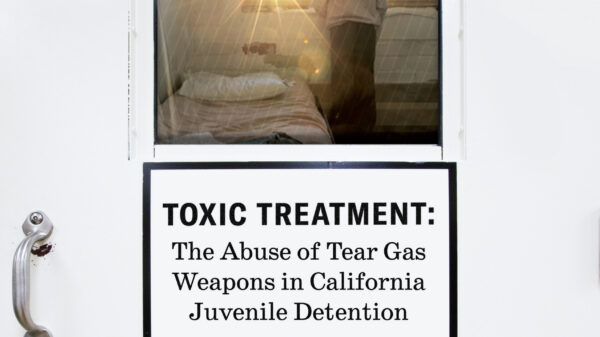LOS ANGELES — The chemical agent known as pepper spray is so toxic that it's classified in California law as a tear gas weapon. But in juvenile detention facilities in many parts of California, this weapon — which can cause not only intense pain, but also blistering of the skin, respiratory arrest, and even an increased risk of strokes and heart attacks — is alarmingly overused on youths as young as 12.
Today the American Civil Liberties Union Foundations of California release a report — "Toxic Treatment: The Abuse of Tear Gas Weapons in California Juvenile Detention" — that is the first to detail use of this tear gas weapon in California’s state and county juvenile detention facilities.
“Using tear gas weapons as a way to control children in the juvenile justice system is harmful and punitive,” said Ian Kysel, a staff attorney at the ACLU SoCal and author of the report. "But it's also unnecessary. As 35 other states recognize, it is possible to treat youth in detention with humanity and dignity."
The report found that officials in juvenile facilities in California used this tear gas weapon — which can have detrimental psychological as well as physical effects — more than 5,000 times between January 2015 and March 2018. The number of incidents may be much higher, but 13 counties in the state failed to provide data on how often it was utilized.
The report calls for banning the use of chemical agents like pepper spray in all juvenile detention facilities in California. Seven counties in the state have already done so.
The Los Angeles County Probation Department — which oversees one of the largest juvenile justice agencies in the world — is likely to join them soon. The Los Angeles County Board of Supervisors has directed the probation department to eliminate the spray in its juvenile facilities by the end of the year.
The report recommends:
- A legislative, complete ban on the use of all chemical agents — including but not limited to tear gas weapons such as pepper spray — against youths in the juvenile justice system in California.
- If a statewide ban is not implemented immediately, counties and state agencies that continue to allow this form of use-of-force in juvenile facilities should be required to make information involving the chemical agents use publicly available.
The ACLU of California furthermore calls for robust transparency on all uses of force in juvenile detention facilities.
Read the report here: aclusocal.org/toxictreatment
Stay Informed
Sign up to be the first to hear about how to take action.
By completing this form, I agree to receive occasional emails per the terms of the ACLU’s privacy statement.
By completing this form, I agree to receive occasional emails per the terms of the ACLU’s privacy statement.

